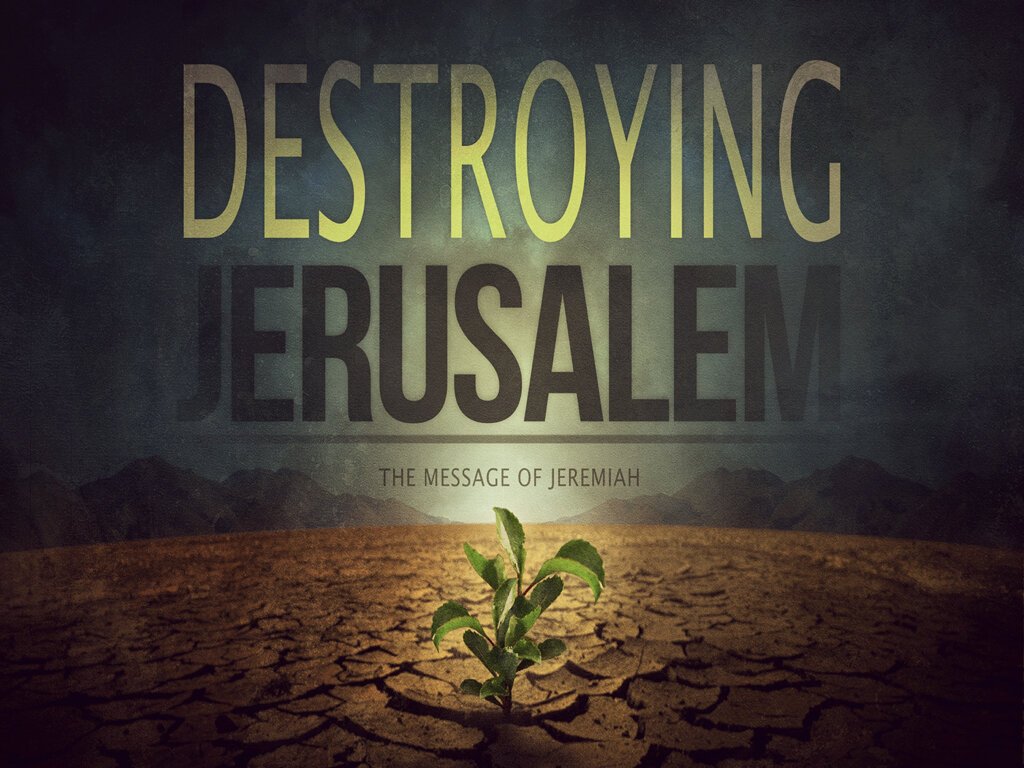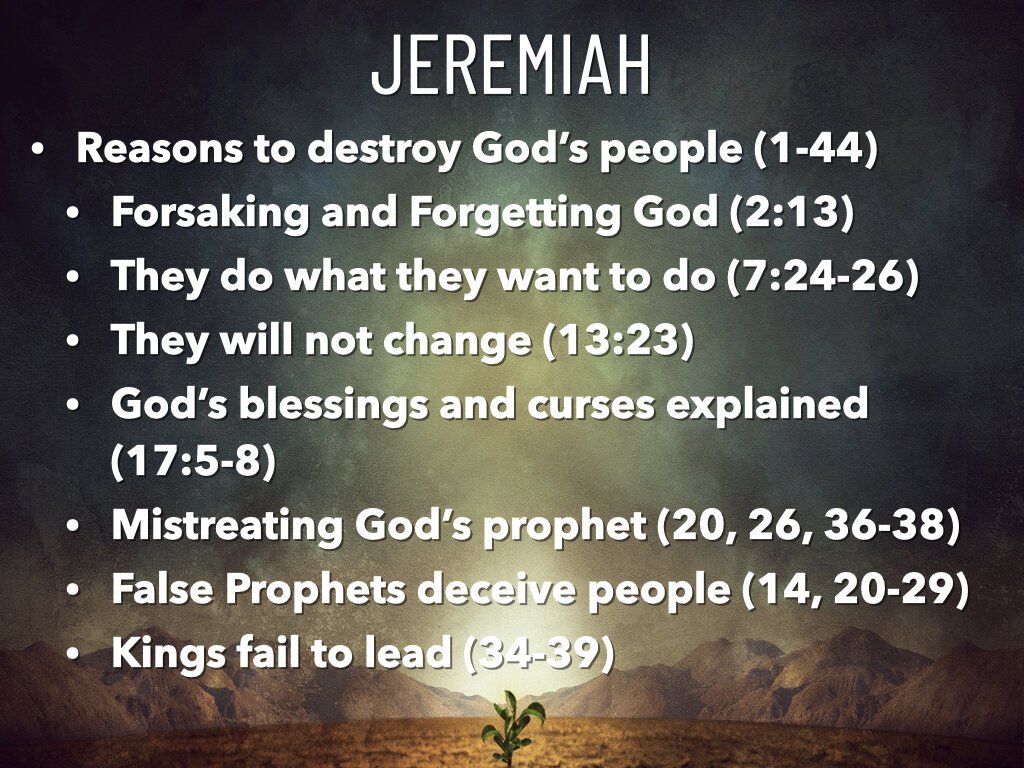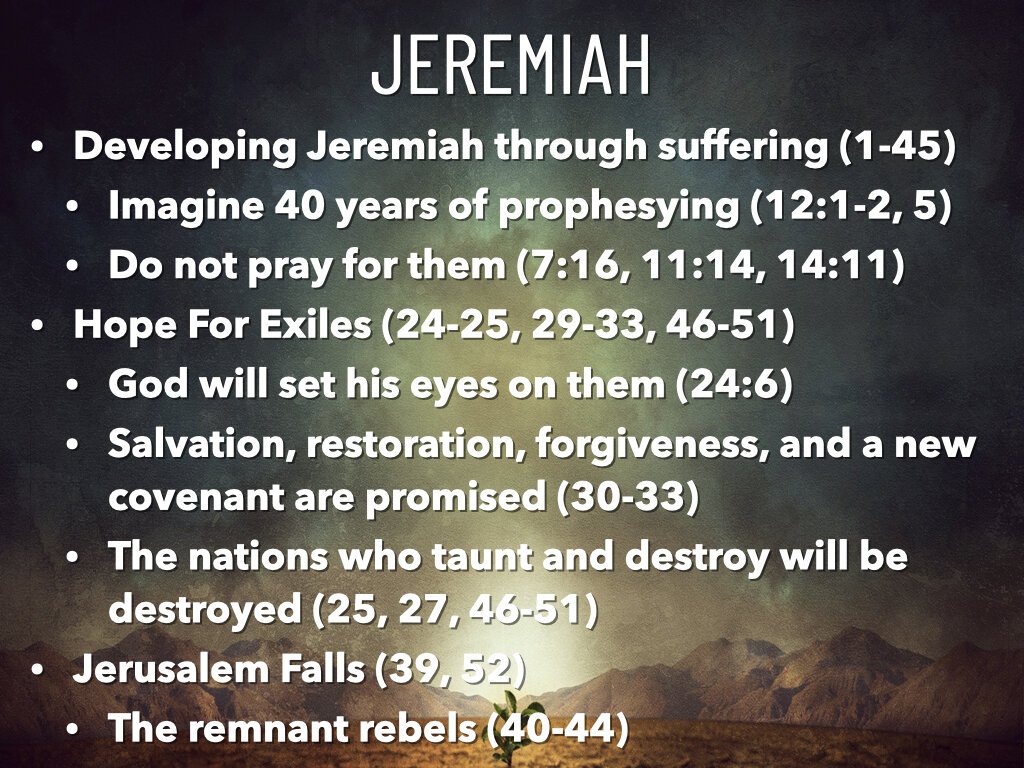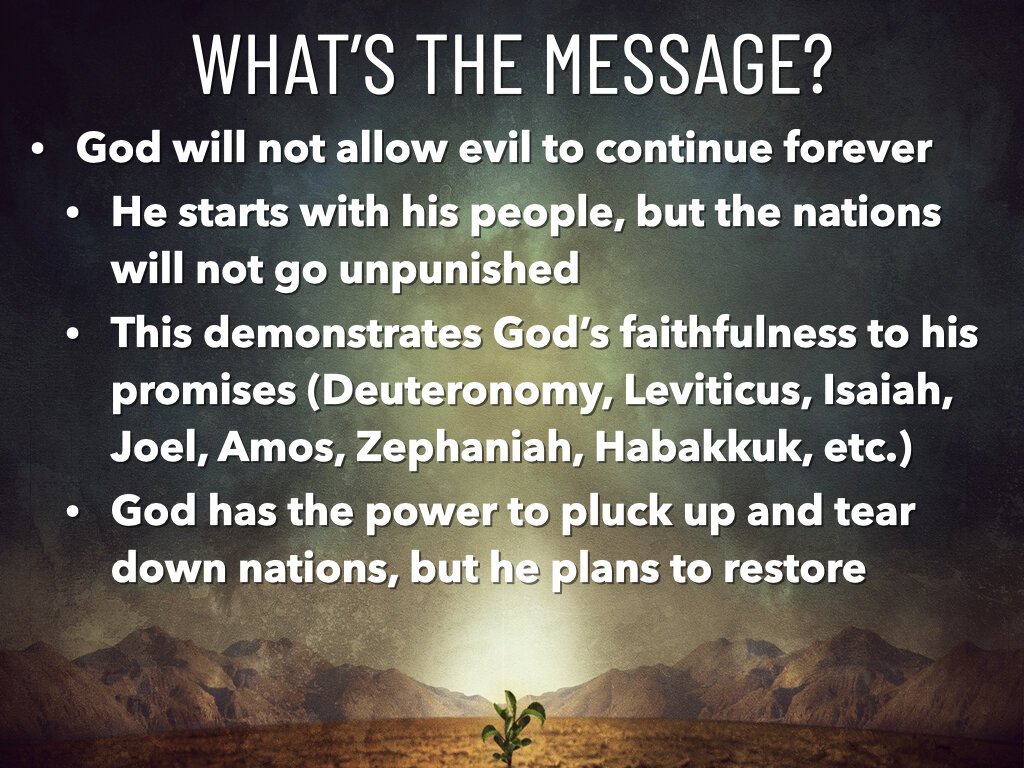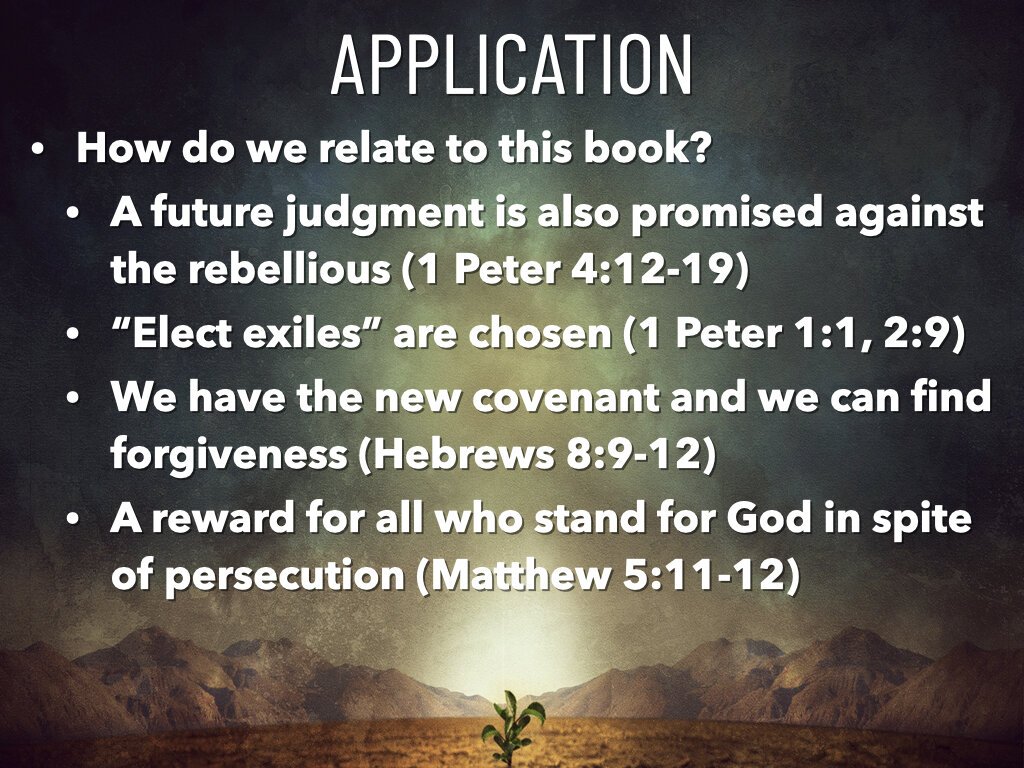Destroying Jerusalem (Jeremiah)
We have recently studied the temple construction in Jerusalem. After it was constructed, do you remember what Solomon prays for God to do? He asks God to make the temple a place where people could turn and find God. He wants God to make the temple and Jerusalem his temple and his city. In response, God said, "My eyes and my heart will be there for all time." But he also makes a promise that he will cast the temple out of his sight if his people abandon him to serve other gods. Jeremiah is a book about that happening.
Over forty years, Jeremiah prophesies and teaches the people about the coming destruction. Can you imagine spending forty years of your life telling people that they will be destroyed if they don't repent? One of the most interesting facts is that Jeremiah is the second largest book in the Bible, behind Psalms. Think about that for a minute. Why would God spend so much time and effort talking to his people about this judgment? One of the nuggets I got out of our study in Starkville this last week was the truth that every judgment in scripture points us toward a final day of judgment. If you want to know why God destroys nations, Jeremiah explains that in great detail. If you would like to see how God feels about killing his people, Jeremiah also explains his heartbreak. But the most crucial idea that Jeremiah conveys to us is what God is planning to accomplish after the judgment. I really like the words of Tommy Holley, who I got to study with last week. He said, “Jeremiah is full of judgment, but now and then, words of hope pierce the clouds like rays of sunshine through the thunderclouds.”
I want to give you a big picture look at this book to feel more comfortable studying it, but this is not a simple book with an easy layout. It seems to jump around a lot over the course of Jeremiah’s ministry. One person has suggested that all the pieces of Jeremiah might have been in order until someone dropped them and mixed them up. I don’t know that for sure, but it is not completely chronological. There is not enough time to cover everything. But that's what Bible class is for.
Overview
From a big picture perspective, the book of Jeremiah is primarily about the destruction of Jerusalem, but it's also about Jeremiah, the nations, the kings of Judah, and false prophets.
Reasons For Judging God's People (1-20)
In the first six chapters, God tries to convince the people to repent, but they like to act faithful while continuing to sin.
Chapter 7 shows that God is done. Their hypocrisy does not deceive him, and he will not let them ruin his name. Listen to what God tells Jeremiah.
Jeremiah 7:16 (ESV) --- 16 “As for you, do not pray for this people, or lift up a cry or prayer for them, and do not intercede with me, for I will not hear you.
Why would God say that to his prophet?
Jeremiah 7:24--26 (ESV) --- 24 But they did not obey or incline their ear, but walked in their own counsels and the stubbornness of their evil hearts, and went backward and not forward. 25 From the day that your fathers came out of the land of Egypt to this day, I have persistently sent all my servants the prophets to them, day after day. 26 Yet they did not listen to me or incline their ear, but stiffened their neck. They did worse than their fathers.
They will not submit to God. They will not change their stubborn and rebellious hearts. Throughout the rest of these chapters, we see God's people do all kinds of evil. They act like they want to obey God when times are tough, but they reject him. Listen to this description of the people.
Jeremiah 13:23 (ESV) --- 23 Can the Ethiopian change his skin or the leopard his spots? Then also you can do good who are accustomed to do evil.
God is not buying their empty words. He sees right through their lies and their idolatrous hearts. He promises to send them judgment in the form of famine, the sword, and pestilence.
In Chapter 17, we find the best summary of why God judges his people.
Jeremiah 17:5--8 (ESV) --- 5 Thus says the Lord: “Cursed is the man who trusts in man and makes flesh his strength, whose heart turns away from the Lord. 6 He is like a shrub in the desert, and shall not see any good come. He shall dwell in the parched places of the wilderness, in an uninhabited salt land. 7 “Blessed is the man who trusts in the Lord, whose trust is the Lord. 8 He is like a tree planted by water, that sends out its roots by the stream, and does not fear when heat comes, for its leaves remain green, and is not anxious in the year of drought, for it does not cease to bear fruit.”
Those who trust in man will be cursed, while those who trust in God will be blessed.
Developing Jeremiah (8-20)
We learn more about Jeremiah than any other prophet in the Old Testament. As we study through this section, Jeremiah sees his nation get worse and worse. Imagine how painful that would be. You know that these people around you will continue to get worse until God destroys them all around you. Jeremiah is suffering much.
Jeremiah 10:19--21 (ESV) --- 19 Woe is me because of my hurt! My wound is grievous. But I said, “Truly this is an affliction, and I must bear it.” 20 My tent is destroyed, and all my cords are broken; my children have gone from me, and they are not; there is no one to spread my tent again and to set up my curtains. 21 For the shepherds are stupid and do not inquire of the Lord; therefore they have not prospered, and all their flock is scattered.
They want to murder Jeremiah for his prophecies. But eventually, Jeremiah gets so upset that he complains to God about this. He sounds a lot like Habakkuk did.
Jeremiah 12:1--2 (ESV) --- 1 Righteous are you, O Lord, when I complain to you; yet I would plead my case before you. Why does the way of the wicked prosper? Why do all who are treacherous thrive? 2 You plant them, and they take root; they grow and produce fruit; you are near in their mouth and far from their heart.
God hears his concern and encourages him to be strong because it's going to get worse. These people will not change for the better.
Jeremiah 12:5 (ESV) --- 5 “If you have raced with men on foot, and they have wearied you, how will you compete with horses? And if in a safe land you are so trusting, what will you do in the thicket of the Jordan?
If Jeremiah thought this was too much, how will he make it through what lies ahead? In Chapter 14, God tells us about a time of extreme drought. The people seem to reach out to God, but they don't find him. Their temporary plea does not persuade God. He says in Chapter 15 that Moses and Samuel would not be heard if they were to intercede for these people. Apparently, this makes Jeremiah's life unbearable. They hate him for his words from God. Jeremiah calls out to God with sorrow and dismay. In response, God speaks some hard words to his prophet. He tells him that God will take away everything from Jeremiah if he wants to act like that. Jeremiah's struggles are making him falter, but he repents and puts his trust in God. Then, God restores him and makes him his prophet again.
From this point on, we see Jeremiah show more and more faith. He develops strength by relying on God through tremendous suffering.
Jeremiah 16:19--20 (ESV) --- 19 O Lord, my strength and my stronghold, my refuge in the day of trouble, to you shall the nations come from the ends of the earth and say: “Our fathers have inherited nothing but lies, worthless things in which there is no profit. 20 Can man make for himself gods? Such are not gods!”
Jeremiah 17:14--18 (ESV) --- 14 Heal me, O Lord, and I shall be healed; save me, and I shall be saved, for you are my praise. 15 Behold, they say to me, “Where is the word of the Lord? Let it come!” 16 I have not run away from being your shepherd, nor have I desired the day of sickness. You know what came out of my lips; it was before your face. 17 Be not a terror to me; you are my refuge in the day of disaster. 18 Let those be put to shame who persecute me, but let me not be put to shame; let them be dismayed, but let me not be dismayed; bring upon them the day of disaster; destroy them with double destruction!
He will be thrown into stocks, cast into prison, and thrown into a dungeon (like a muddy cistern), and struck on the face. All of this happens just because he warns the people of the coming destruction and tries to help save them. Can you imagine what that would be like? Is it any wonder why God tells him not to be married?
False Prophets (14, 20-29)
In this section, we also notice that false prophets rise up to refute what Jeremiah prophesies. They repeatedly try to deceive the people, but God sends specific judgments for each of them. The first event is in Chapter 14, but it really starts happening a lot in Chapter 20-29. Jeremiah tells everyone to repent because God will destroy them if they refuse. Then, the false prophets come back and say, "That's enough repenting. God will not destroy you now. Everything will be peaceful." These prophets are very popular because they tell people what they want to hear.
Jeremiah 23:16--17 (ESV) --- 16 Thus says the Lord of hosts: “Do not listen to the words of the prophets who prophesy to you, filling you with vain hopes. They speak visions of their own minds, not from the mouth of the Lord. 17 They say continually to those who despise the word of the Lord, ‘It shall be well with you’; and to everyone who stubbornly follows his own heart, they say, ‘No disaster shall come upon you.’ ”
Unfortunately, that means that they can do what they want to Jeremiah. They throw Jeremiah in stocks overnight and cause him all kinds of grief. Hananiah (28) and Shemaiah (29) speak the exact opposite of Jeremiah and are cursed. God even calls out the false prophets in the nations and judges them.
Hope For Exiles (24, 29-33)
There are also many bright sections of the book. As dark a picture as God paints of the people's sins, the words of God's future plans are wonderful. In Chapter 24, he tells those in exile that he will "set his eyes on them for good." They need to prepare themselves to stay in captivity for a while. In Chapter 25, he says that the captivity will last seventy years. Then, in Chapter 29, he tells them that he plans to bring them back from exile and establish them in Jerusalem again.
Jeremiah 31:3--5 (ESV) --- 3 the Lord appeared to him from far away. I have loved you with an everlasting love; therefore I have continued my faithfulness to you. 4 Again I will build you, and you shall be built, O virgin Israel! Again you shall adorn yourself with tambourines and shall go forth in the dance of the merrymakers. 5 Again you shall plant vineyards on the mountains of Samaria; the planters shall plant and shall enjoy the fruit.
Jeremiah 31:7 (ESV) --- 7 For thus says the Lord: “Sing aloud with gladness for Jacob, and raise shouts for the chief of the nations; proclaim, give praise, and say, ‘O Lord, save your people, the remnant of Israel.’
Jeremiah 31:10--14 (ESV) --- 10 “Hear the word of the Lord, O nations, and declare it in the coastlands far away; say, ‘He who scattered Israel will gather him, and will keep him as a shepherd keeps his flock.’ 11 For the Lord has ransomed Jacob and has redeemed him from hands too strong for him. 12 They shall come and sing aloud on the height of Zion, and they shall be radiant over the goodness of the Lord, over the grain, the wine, and the oil, and over the young of the flock and the herd; their life shall be like a watered garden, and they shall languish no more. 13 Then shall the young women rejoice in the dance, and the young men and the old shall be merry. I will turn their mourning into joy; I will comfort them, and give them gladness for sorrow. 14 I will feast the soul of the priests with abundance, and my people shall be satisfied with my goodness, declares the Lord.”
Chapters 30-33 also give detailed plans for the Messianic kingdom God is going to establish. All of these words are some of the most hopeful in the Bible.
Jeremiah 31:31--34 (ESV) --- 31 “Behold, the days are coming, declares the Lord, when I will make a new covenant with the house of Israel and the house of Judah, 32 not like the covenant that I made with their fathers on the day when I took them by the hand to bring them out of the land of Egypt, my covenant that they broke, though I was their husband, declares the Lord. 33 For this is the covenant that I will make with the house of Israel after those days, declares the Lord: I will put my law within them, and I will write it on their hearts. And I will be their God, and they shall be my people. 34 And no longer shall each one teach his neighbor and each his brother, saying, ‘Know the Lord,’ for they shall all know me, from the least of them to the greatest, declares the Lord. For I will forgive their iniquity, and I will remember their sin no more.”
Against the Kings of Judah (34-39)
I could probably just end there, and you would have a good feel for the book. But there is a lot more information in this book. Chapters 34-39 are full of events surrounding the two primary kings leading up to the destruction, Jehoiakim and Zedekiah. These kings were cowards and stubbornly rebellious in their own ways. Neither of them helped Jeremiah or listened to him for very long.
Examples of Faithfulness (35, 38:7-13, 45)
Scattered throughout the latter part of the book, we also find some examples of faithful people besides Jeremiah. In Chapter 35, we learn about the Rechabites, who remain loyal to their father's covenant. Interestingly enough, they aren't Israelites. They descended from Moses' father-in-law, Jethro, who was a Midianite.
Then, we read about Ebed-Melech, who is an Ethiopian. He saves Jeremiah from the dungeon.
Finally, we read about Baruch, who is a scribe for Jeremiah. He struggles with all that is going on, and God speaks plainly to him.
Jeremiah 45:3--5 (ESV) --- 3 You said, ‘Woe is me! For the Lord has added sorrow to my pain. I am weary with my groaning, and I find no rest.’ 4 Thus shall you say to him, Thus says the Lord: Behold, what I have built I am breaking down, and what I have planted I am plucking up---that is, the whole land. 5 And do you seek great things for yourself? Seek them not, for behold, I am bringing disaster upon all flesh, declares the Lord. But I will give you your life as a prize of war in all places to which you may go.”
The reward in every case is that they get to live. Everything else will be destroyed, but they get their life as a prize.
Jerusalem Falls (39, 52)
In Chapter 39, we read the horrible details about the destruction of Jerusalem. Then, the destruction is repeated in Chapter 52. You can sense the emphasis of this event. This is a big deal. If God is willing to destroy his city for their rebellion, who will not be destroyed?
A Rebellious Remnant (40-44)
Unfortunately, the remnant that survives the destruction did not get the point. They continued to rebel against God, and they drag Jeremiah in with them. Chapters 40-44 describe those events.
Against the Nations (25, 27, 46-51)
Another interesting part of Jeremiah that we have seen in many of the prophets is God's intention to destroy all nations. He predicts that he will do this in Jeremiah 25 and 27.
Jeremiah 25:28--29 (ESV) --- 28 “And if they refuse to accept the cup from your hand to drink, then you shall say to them, ‘Thus says the Lord of hosts: You must drink! 29 For behold, I begin to work disaster at the city that is called by my name, and shall you go unpunished? You shall not go unpunished, for I am summoning a sword against all the inhabitants of the earth, declares the Lord of hosts.’
Jeremiah 27:6--11 (ESV) --- 6 Now I have given all these lands into the hand of Nebuchadnezzar, the king of Babylon, my servant, and I have given him also the beasts of the field to serve him. 7 All the nations shall serve him and his son and his grandson, until the time of his own land comes. Then many nations and great kings shall make him their slave. 8 “ ‘ “But if any nation or kingdom will not serve this Nebuchadnezzar king of Babylon, and put its neck under the yoke of the king of Babylon, I will punish that nation with the sword, with famine, and with pestilence, declares the Lord, until I have consumed it by his hand. 9 So do not listen to your prophets, your diviners, your dreamers, your fortune-tellers, or your sorcerers, who are saying to you, ‘You shall not serve the king of Babylon.’ 10 For it is a lie that they are prophesying to you, with the result that you will be removed far from your land, and I will drive you out, and you will perish. 11 But any nation that will bring its neck under the yoke of the king of Babylon and serve him, I will leave on its own land, to work it and dwell there, declares the Lord.” ’ ”
Then, he describes it in greater detail in Chapters 46-51. His movement in this section is from Egypt to Babylon. He will judge his nation, the nation that his people rely on, all the surrounding nations who taunt his people. Finally, he comes back around to destroy the nation that destroyed his people. This is the way God maintains his justice and his righteousness, as he also foretold in the book of Habakkuk.
The last section of the book tells us that one of Judah's kings, Jehoiachin, is released from prison and allowed to eat at the king's table. This is an indicator that God is bringing back the seed of David to rule.
What's The Message?
As we briefly covered this huge book, hopefully, you can see the righteousness of God. He does not allow his people to live in continual rebellion and sin. He does not allow them to oppress the innocent. God has proven faithful to all of the promises he has made in the prophets until this point. He said he would do this back in Deuteronomy. He has been patient and compassionate toward his people, persistently sending them prophets and trying to convince them to turn away from their sins. But they won't listen! So God takes away all of their joy and replaces it with mourning. They want to do whatever comes into their heart, so God gives them the rotten fruit of their rotten deeds.
The way God interacts with Jeremiah is one of the most interesting parts of this story. No one would ask for the mission God sends Jeremiah on, but Jeremiah grows strong in faith and endures tremendous hardship for the Lord. God makes him like a fortified city and protects him from horrible circumstances.
But the sad message of this book is that, as much as God wanted Israel to be his people, they refused to love him and follow his commands. So God demonstrates his power to pluck up a nation and destroy it. He does the same with all of the other nations of the earth. One by one, they fall. But he has plans to restore and rebuild. He is not done with mankind yet.
Application
The best thing that we can do for ourselves is to tenderize our hearts. We must not harden our hearts to believe the lies that sound good to us because if we develop stubborn, rebellious hearts that will not hear the truth, we have the assurance that God will judge the secrets of our heart.
1 Peter 4:12--19 (ESV) --- 12 Beloved, do not be surprised at the fiery trial when it comes upon you to test you, as though something strange were happening to you. 13 But rejoice insofar as you share Christ’s sufferings, that you may also rejoice and be glad when his glory is revealed. 14 If you are insulted for the name of Christ, you are blessed, because the Spirit of glory and of God rests upon you. 15 But let none of you suffer as a murderer or a thief or an evildoer or as a meddler. 16 Yet if anyone suffers as a Christian, let him not be ashamed, but let him glorify God in that name. 17 For it is time for judgment to begin at the household of God; and if it begins with us, what will be the outcome for those who do not obey the gospel of God? 18 And “If the righteous is scarcely saved, what will become of the ungodly and the sinner?” 19 Therefore let those who suffer according to God’s will entrust their souls to a faithful Creator while doing good.
2 Timothy 2:11--13 (ESV) --- 11 The saying is trustworthy, for: If we have died with him, we will also live with him; 12 if we endure, we will also reign with him; if we deny him, he also will deny us; 13 if we are faithless, he remains faithful--- for he cannot deny himself.
One of the most amazing thoughts to me is the outcome of Jeremiah's life. If what Jesus says is true, Jeremiah is undoubtedly one of the greatest in the kingdom of heaven.
Matthew 5:11--12 (ESV) --- 11 “Blessed are you when others revile you and persecute you and utter all kinds of evil against you falsely on my account. 12 Rejoice and be glad, for your reward is great in heaven, for so they persecuted the prophets who were before you.
We need God to train us to be like Jeremiah to withstand any amount of suffering, persecution, and punishment. If we develop that level of faith, we will have a great reward waiting for us.
Conclusion
God has given us the prophet Jeremiah to show us that the wicked will not prosper in the end. God can bring about judgment on an entire nation, even when it doesn't seem like he could. He does it to Jerusalem again in 70 AD, and he can do it to every nation that persists in stubborn rebellion against him and his people. But all of these judgments point toward a final day of judgment when the earth will be wiped clean. That could happen at any time. His mercy is available through Jesus' sacrifice. Will we accept it and be given eternal life as a reward?

